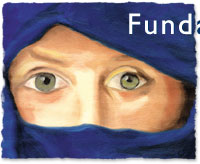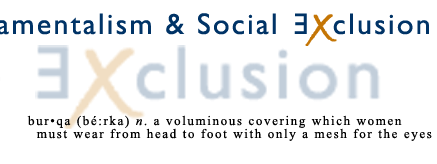AMHERST, Mass.–Nine days ago there was an alarming indication of upheaval in Pakistan — a crackdown on the press. According to the Committee to Protect Journalists, the government pressured the owner of an influential English language newspaper, the News, to fire four journalists. One of them, the paper’s editor, Shaheen Sehbai, said the trouble started after his newspaper reported a link between the prime suspect in the killing of Wall Street Journal reporter Daniel Pearl, and recent attacks on the Indian parliament in Delhi and in the Kashmiri capital, Srinagar. When Sehbai asked the paper’s owner to identify who wanted to sack them, Sehbai said he was told to see officials at the ISI, Pakistan’s Inter-Services Intelligence agency. Instead he resigned and left for the United States.
I suspected that the crackdown on the media was associated with Pearl’s kidnapping and murder. Even from the United States, where I am right now, I could tell that Pearl’s slaying was more than an indication of a new level of political violence. It was also a stark reminder of the tenuous position of journalists in Pakistan — especially when they tread on the delicate topic of the country’s mysterious intelligence service, its link to Islamic groups and its power over the government of Pakistan.
For the past month, as a former reporter for Pakistan’s Dawn newspaper, I have been sifting through the evidence trying to figure out what Pearl’s murder was really about. It was not just a matter of his being an American and a Jew, though that was certainly part of it. In setting out to investigate the possible connection between alleged shoe-bomber Richard Reid and the Islamist groups in the region, Pearl had entered dangerous ground.
It was ground that few Pakistani journalists would even attempt to cover: exploring the complex ties between the militant Islamist groups and the many intelligence agencies. Local news organizations are so infiltrated by intelligence agents that they can do little independent reporting on this subject. Moreover, as the latest crackdown on the press illustrates, Pakistani governments, past and present, have been using intelligence agencies to twist the arms of publishers, editors and journalists who dare to expose their dirty secrets.
I don’t know how much Pearl found out. But I know full well how likely journalists are to become the targets of the intelligence agencies. I found out the hard way in September 1991. It had been only two years since the country had returned to democracy and a free press was only barely tolerated by then-Prime Minister Nawaz Sharif. I began writing about the tactics his government was using to coerce opposition politicians to change their loyalties and indict their leader, former prime minister Benazir Bhutto.
My investigative reports led me into a maze of competing intelligence agencies. One day in late September, we journalists in Karachi rallied against the stabbing of Kamran Khan, one of the reporters under fire at the News, who is known for using sources among the intelligence agencies and who also works as a special correspondent for The Washington Post. That night, as I reached home, I saw two men — knives glinting in their hands — approaching my car. Sensing danger, I raced back to the office. Coming after a spate of attacks on journalists, the incident generated new protests — with rallies and demonstrations by media organizations throughout the country culminating in newspapers suspending publication for one day.
The latest crackdown suggests that the Pakistani government may be hiding some of the facts on the Pearl case. For Pakistan, the Sept. 11 terrorist attacks have forced the military government to begin the very difficult process of disassociating itself from the Islamic militants with which it has traditionally kept close ties. These linkages were strengthened during the Cold War when the Reagan administration and the Saudi government used Pakistan’s military dictator, Gen. Mohammed Zia ul-Haq, to funnel billions of dollars’ worth of arms and ammunition to the Afghan resistance through Pakistan’s Islamic parties. At home President Zia promoted conservative Islamic officers to generals in the army. As a result, the ISI grew powerful enough to sideline the subsequent civilian governments of Sharif and Bhutto and become the chief architect of the Taliban government in Afghanistan.
Even after Pakistan got on board with the U.S. anti-terrorist coalition, the intelligence agencies did not sever ties with the Islamic parties. Then, as the United States stepped up pressure, the agencies began reducing their support for these parties. In December, I saw a pro-Taliban demonstration in Islamabad that attracted fewer than 100 people. Only a month ago earlier, thousands of violent pro-Taliban demonstrators had rampaged through the streets, even though they failed to find support from the masses. In fact, Pakistan’s Islamist parties have never won more than 2 percent of the vote in any democratic election — and have therefore looked to the military to capture power. In turn, the military — and their multiple intelligence agencies — have found the parties useful for reining in opponents.
As Pearl’s kidnapping and murder show, Musharraf’s task of quelling Islamic militancy is a daunting one. To recognize that challenge requires not only understanding the anti-Western, anti-Semitic rhetoric of the Islamic extremists, but also the flash point of Kashmir. That is a grievance that can unite Muslims who believe the disputed territory should be freed from Indian control, and it provides a battleground for fundamentalists. It is clear that Pearl’s suspected kidnappers have taken that cause to heart.
Remember the Indian passenger airline that was hijacked from Kathmandu, Nepal, in December 1999 and made a series of stops in Pakistan and Dubai before finally landing in Kandahar? There, the Taliban surrounded the plane and gave safe passage to the hijackers. They were demanding that India release three members of a Pakistan-based Islamist group, which was launching attacks against the Indian military in Kashmir. The Indian foreign minister traveled to Kandahar and handed over the political prisoners, who included Masood Azhar and Saeed himself.
Once freed from jail in India, Azhar and his entourage returned to Pakistan and remained untroubled by government security forces. I well remember how, with their long beards and turbans, they swaggered into the Karachi Press Club in March 2000 for a news conference. They told the assembled journalists how they had been carrying out jihad against the Indian military in Kashmir. Azhar announced that they were changing the name of the group from Harkat ul-Ansar to Jaish-i-Mohammed — which literally means “Army of Mohammed.” Harkat ul-Ansar had by then been declared a terrorist organization by the United States.
We journalists were curious why Azhar — the newly appointed chief of Jaish-i-Mohammed — had chosen this moment to make a public appearance. President Clinton was about to visit Pakistan on a stopover from India. Three months beforehand, Musharraf had taken over Pakistan’s government in a military coup — and this had not sat well with the U.S. administration. Hinting at a rift in Pakistan’s intelligence agencies, one reporter asked Azhar if his appearance was intended to embarrass Musharraf before Clinton’s visit. I asked the same question more bluntly: “Are you being supported by Pakistan’s Inter-Services Intelligence?” Azhar answered both questions with a curt “No.” It was the answer we expected, but it did little to allay our suspicions.
Since their release from Indian jails, Azhar, Saeed and their supporters have moved freely in and out of Afghanistan and Pakistan. Azhar was put under house arrest last fall only after the United States put pressure on Pakistan to curb jihadi groups. Pakistan turned down a U.S. request to extradite Saeed, despite his known role in kidnapping Western tourists in New Dehli in 1994. Soon after he turned himself in in January, Saeed confessed to his role in Pearl’s abduction — though he later denied it. Many other Kashmiri and Sunni militant groups are still operating freely in Pakistan, and the latter have intensified sectarian killings inside the country.
The U.S. war on the al Qaeda network has signaled a new phase for the reorganization of militant Islamic groups in Pakistan. As the United States bombed Taliban targets, the Pakistan-based Kashmir militants began slipping home through the porous Afghan borders. Among them were the Harkat ul-Mujaheddin, some of whose members were killed by the U.S. bombing in Kabul last October while holding a meeting. When the bodies of the “martyrs” were brought to a mosque in Karachi, thousands of people attended the funeral processions — and promised revenge against the United States.
That revenge came in the form of an innocent victim, Pearl, whom the shifting militant forces saw primarily as an American and a Jew. The militant groups now identify Western journalists with the enemy. Traveling with a group of Western journalists to the Afghan border in December, I witnessed firsthand the anger of the defeated Pakistan supporters of the Taliban as the U.S. troops bombed Kandahar. Our convoy was making its way from the winding hills of Chaman in Pakistan (about two hours from Kandahar) when our vehicle was pelted with stones from angry Pashtuns. A BBC film crew traveling with us was also attacked. But the worst hit was British print journalist Robert Fisk, who appeared the next morning at our Quetta hotel with his head swathed in bandages.
As Saeed’s ties with intelligence agencies become exposed, there are growing concerns among Pakistani analysts that he could be killed in custody in order to destroy evidence of his linkages. In fact, Saeed is being moved from one place to another — reportedly to prevent him from being killed. Another cause for concern is the widespread corruption in Pakistan — where police alternately fabricate and destroy evidence, depending on pressure from above. The net result is that even prominent murder cases have dragged on for years in the courts without leading to any convictions.
A decade ago, it was the unity of journalists that enabled me to put the frightening knife attack behind me and to focus on getting out the truth. At that stage, I’d been predicting that unless we maintained unity, journalists could be killed for investigative reporting. Pearl’s murder came as a blow to independent reporting in Pakistan. His brave wife, Mariane, has spoken about how his case highlights the importance of joining hands to fight terrorism. Whether this is achieved through the extradition of Saeed and his accomplices to the United States or through monitoring the court process in Pakistan, it is imperative that the culprits be punished. The frightening fact is that Pearl’s murder has uncovered the tip of an iceberg. The challenge now is to continue the work he began — and investigate how terrorist forces are realigning in the region to threaten civil society.
Nafisa Hoodbhoy, who worked for 16 years for Dawn newspaper in Karachi, Pakistan, teaches at the University of Massachusetts with a focus on women, politics and the media in Pakistan, Afghanistan and Iran.
Source: The Washington Post



